Iran Tells Taliban To Form An Inclusive Government To Receive Support
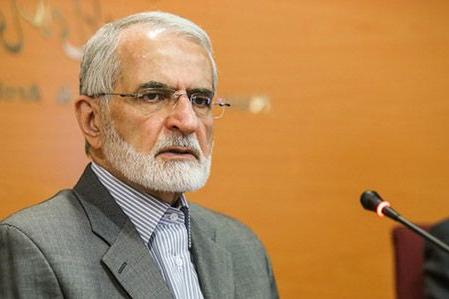
A foreign policy advisor to Iran’s Supreme Leader has said that Taliban will receive support if they form an inclusive government and prevent foreign influence in Afghanistan.

A foreign policy advisor to Iran’s Supreme Leader has said that Taliban will receive support if they form an inclusive government and prevent foreign influence in Afghanistan.
Kamal Kharrazi, head of Iran’s Strategic Council on Foreign Relations said on Tuesday that “If Taliban, during their rule provide for the formation of an inclusive government of different minorities, protect the country’s independence and not allow foreign powers to have a presence and influence in the country, they will be embraced by the Islamic resistance front.”
The Islamic resistance front is a reference to an anti-American regional group of forces maintained by the Islamic Republic, including Iraqi Shiite militias, the Lebanese Hezbollah and Yemen’s Houthis.
Kharrazi in fact appears to be asking the Taliban to join Iran's alliance system in the Middle East, while the new rulers of Afghanistan are closely aligned with Pakistan where they were sheltered for two decades.
Khamenei’s advisor, however, added that “It is too soon to speak about the Taliban movement.” He went on the say that Iran cannot forget the killing of its diplomats in Mazar-e-Sharif in 1998, while both Taliban and Pakistan had assured Tehran about their safety.
Kharrazai’s statement came one day before a meeting of Afghanistan’s neighbors is due to take place in Tehran.
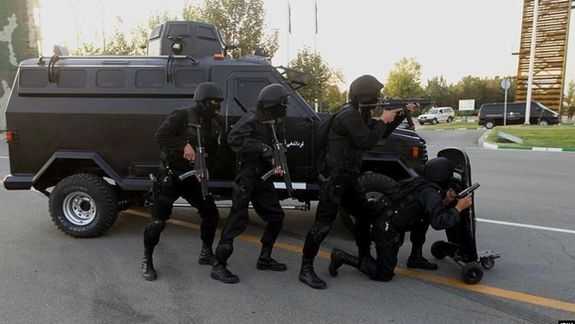
The UN Special Rapporteur for Iran said in a report on Monday that Iran often uses lethal force against protesters exercising their right to peaceful assembly.
Javaid Rehman, who has not been allowed to visit the country, pointed to live ammunition used during water protests in the south-western province of Khuzestan in July, when he said at least nine people including a minor were killed and others injured.
Many international human rights organizations, experts, the media and some governments have accused Iran of killing hundreds of protesters since late 2017, using military ammunition.
Zahra Ershadi, Iran’s deputy ambassador to the UN, said that such reports "only aim to use human rights as an instrument against other countries" and that Rehman had used information provided by "terrorist groups" and "sworn enemies of the Islamic Republic."
Ershradi said the appointment of a special rapporteur for Iran – since the 1980s one of few countries to be so investigated – had been an initiative of the West, especially Canada. Reflecting Iran’s common approach of alleging double standards, Eshradi cited recent discoveries in Canada of mass graves of indigenous childrenforced to attend residential schools.
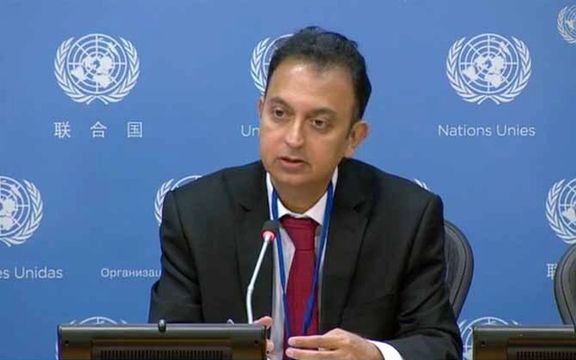
Kazem Gharibabadi, Secretary-General of Iran’s Human Rights Office, said Rehman’s report was “ill-intentioned” and "a completely political and diversionary measure."
The Special Rapporteur’s report said Iran’s use of torture, reliance by courts on confessions, and “other fair trial violations” had led him to conclude that the use of the death penalty amounted to “arbitrary deprivation of life." Rehman cited Kurdish prisoner Amir-Hossein Hatami, who died after allegedly being beaten by prison officials, and the death of Shahin Naseri in custody in September. Naseri was a witness in the case of former cell-mate Navid Afkari, executed last year after alleging he had confessed under duress to murdering a security guard during protests.
“Arbitrary” grounds for a death sentence could turn the punishment into "a political tool,” Rahman argued. While a large number of executions in Iran are carried out for drug offences, Rehman criticized three vague security charges that can carry the death penalty: moharebeh (“waging war against God”), efsad-e fel-arz (“corruption on earth”) and baghy (“armed rebellion”).
The UN Special Rapporteur said he was disturbed by the sentencing of juveniles (under 18s) to death and said it was “imperative” for Iran to undertake criminal law and justice reforms beginning “most urgently” with a moratorium on the death penalty for juvenile offenders.
Rehman was appointed in 2018 as the third Special Rapporteur for Iran since the re-establishment of the mandate in 2011 after a nine-year interval. His mandate was extended by the United Nations Human Rights Council (UNHCR) on March 24.
The first Special Rapporteur on Iran, Venezuelan Andrés Aguilar, lasted two years after he was appointed in 1984, resigning over Tehran’s refusal to cooperate. Reynaldo Galindo Pohl El Salvador, who took over, visited Iran three times between 1990 and 1992 but resigned in 1995 when barred from returning. He was succeeded by Maurice Copithorne, a Canadian lawyer, who was Special Rapporteur until 2002.
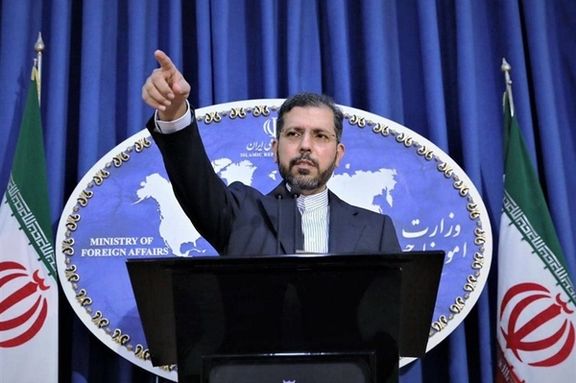
Iran’s foreign ministry has expressed concern about “terrorism, violence and extremism in Afghanistan”, one day ahead of a regional meeting in Tehran.
Saeed Khatibzadeh on Tuesday told reporters that foreign ministers of Uzbekistan, Tajikistan, Turkmenistan and Pakistan will attend the Wednesday conference of Afghanistan’s neighbors, while China and Russia will take part via video link. The Taliban have not been invited to the meeting.
The spokesman added that Iran’s President Ebrahim Raisi is scheduled to address the conference and a letter from the United Nations Secretary Antonio Guterres will be read.
Regarding the absence of the Taliban, Khatibzadeh said that there were many requests from Afghanistan and elsewhere for participation and this will be decided in the next meeting, which will probably take place in Beijing.
Regarding the agenda of the meeting Khatibzadeh told reporters that a unified message should be sent to “inside Afghanistan” that the country cannot be a “place for violence and terror”.
After two major bomb attacks against Afghanistan’s Shiites, Iran has asked the Taliban to protect civilians and strive for including others in the government.
“A peaceful and stable Afghanistan is a partner in regional cooperation. The people of Afghanistan will accept a government that reflects their will,” he said.
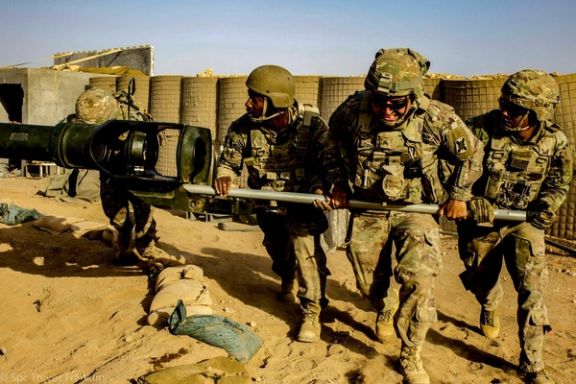
US officials say they believe Iran was behind the drone attack last week at the military outpost in southern Syria where American troops are based.
Officials said Monday the US believes that Iran resourced and encouraged the attack, but that the drones were not launched from Iran. They were Iranian drones, and Iran appears to have facilitated their use, officials said, speaking on condition of anonymity to discuss details that have not been made public.
Officials said they believe the attacks involved as many as five drones laden with explosive charges, and that they hit both the U.S. side of al-Tanf garrison and the side where Syrian opposition forces stay.
Pentagon spokesman John Kirby declined to provide details when asked about the report during a news conference Monday. He called it a “complex, coordinated and deliberate attack” and said the US has seen similar ones before from Shia militia groups that are backed by Iran. But he would not go into specifics and said he had no update on the munitions used in the attack.
Kirby also declined to say if troops were warned ahead of time or whether the US intends to make a military response.
“The protection and security of our troops overseas remains a paramount concern for the secretary,” Kirby said, referring to Defense Secretary Lloyd Austin, “and that if there is to be a response, it will be at a time and a place and a manner of our choosing, and we certainly won't get ahead of those kinds of decisions.

In a rare admission the speaker of Iran’s parliament said Monday, “We could not accomplish anything” with 80 percent of the economy dominated by the government.
In a speech in Mashhad, Mohammad Bagher Ghalibaf, a former top IRGC officer and Tehran mayor, said, “We eliminated people from various areas of public life, or we stratified them”, insisting that without the involvement of large segments of society the Islamic Republic cannot succeed.
Ghalibaf’s remarks come as hardliners loyal to Supreme Leader Ali Khamenei have dominated all three branches of government since February 2020 and have sidelined the loyalist opposition of ‘Reformists’. Ghalibaf himself is accused by former officials and journalists of a role in major corruption schemes in Tehran municipality when he was mayor (2005-2017) and also in suppressing student protests more than two decades ago.
Those who disagreed with the tenants of the Islamic Republic have long been purged by death or exile.
Iran’s economy became dominated by the state after the 1979 revolution when major industries were nationalized in the wake of an Islamic-leftist zeal, and businessman were either jailed, killed or had to flee for their lives.
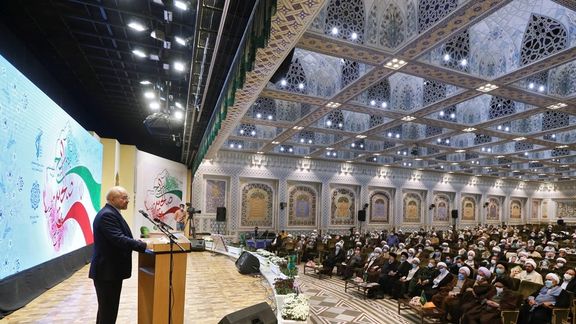
Ghalibaf spoke of alienated youth and asked, “Aren’t these our children…shouldn’t we talk with them?” He also spoke of hardship gripping ordinary workers, saying that they earn less than $200 a month working two jobs and asked, “Shouldn’t we talk about this?”
Anemic economic growth and high inflation that were prevalent since the revolution have become much more acute in the past three years because of United States sanctions. Iran’s currency has dropped almost ninefold since late 2017 and annual inflation is close to 50 percent.
As the situation deteriorates, former and current government officials seem to be competing in advocating for better living conditions for the average Iranian. They also untiringly accuse each other of being responsible for creating the current impasse. Hardliners accuse former President Hassan Rouhani for signing the 2015 nuclear deal, the JCPOA, while reformists argue that without normalization of ties with the rest of the world Iran cannot hope to improve its lot.
Ghalibaf, however, seemed to be taking the rhetoric to a higher level on Monday by saying that without attention to ordinary people even religious beliefs will be eroded. Referring to Shiite sanctities, the speaker of parliament said, “Until when people should show steadfastness for Imam Hussein’s blood?” The grandson of Prophet Muhammed, Hussein, who was killed in 680 AD by other Muslim forces is the saint Shiites uphold as the true heir of the Prophet.
Ghalibaf said, “We were not able to work correctly. We spent more than $20 billion in the past three years to subsidize seven essential imports,” but prices rose for the people. “So, we don’t have a good record in running the country.” He added that open discussion is important because “people are important, and they are the ones to save the religion.”
The speaker who is himself a loyal follower of Khamenei also repeated some of the clerical regime’s favorite themes, such as a “media war” that “enemies” have launched to weaken the Islamic Republic. Another favorite theme he mentioned is a theory advanced by Khamenei that the US created the Islamic State group to weaken Islam.
But Ghalibaf underlined, “When we are in power, we have a responsibility toward everyone, all groups with different views, all religions and ethnic groups, because people live under the umbrella of the Islamic regime, which is in power in the name of religion.”
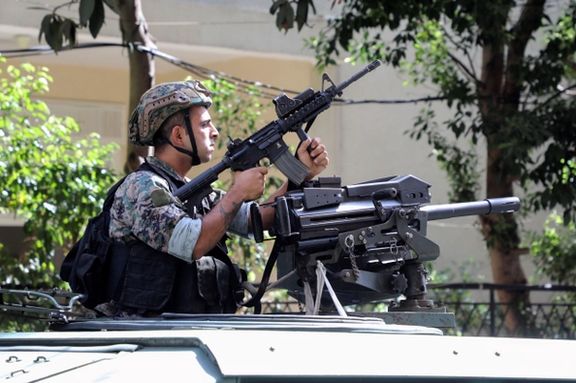
A Lebanese judge on Monday charged 68 people including 18 detainees with murder and incitement to sectarian strife over fatal clashes this month in Beirut.
Seven followers of Lebanon's Shiite Iran-backed Hezbollah group and its ally, the Amal Movement, were killed on Oct. 14 in the worst street violence in Beirut in over a decade.
The gunfire began as protesters assembled for a demonstration called for by Hezbollah and Amal against Judge Tarek Bitar, who is leading an investigation into an explosion at Beirut port that killed over 200 people on Aug. 4 last year.
Monday's charges were filed by Judge Fadi Akiki, a government representative at the military court. They also include charges of attempted murder, possession of unlicensed weapons and destruction of public and private property.
The case was referred to an investigative judge.
Hezbollah has accused the Christian Lebanese Forces party of targeting demonstrators with sniper fire.
The party's leader, Samir Geagea, has denied the allegations and said residents of the Christian-majority Ain al-Remmaneh area, where the violence took place, had acted in self-defense.
In a local television interview last week, Geagea said the trouble began when supporters of the Shi'ite Muslim parties entered the neighborhood and vandalized cars, and that four residents were wounded before a shot was fired.
Footage released later appeared to show at least one person being shot by a soldier.
Report b y Reuters